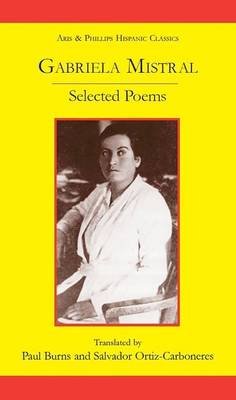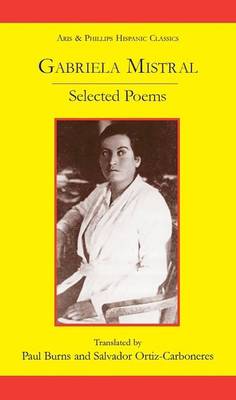
- Retrait gratuit dans votre magasin Club
- 7.000.000 titres dans notre catalogue
- Payer en toute sécurité
- Toujours un magasin près de chez vous
- Retrait gratuit dans votre magasin Club
- 7.000.0000 titres dans notre catalogue
- Payer en toute sécurité
- Toujours un magasin près de chez vous
Description
Gabriela Mistral (1889-1967), Chile's 'other' great poet of the twentieth century, is little known outside the Spanish-speaking world, and unlike Pablo Neruda has not been extensively translated into English. She deserves better, particularly as the first Latin American recipient of the Nobel Prize for Literature (1945), and this selection of her poetry is designed to introduce her to an English-speaking public. Born Lucila Godoy Alcayaga in the Elqui valley in the 'little north' of Chile, she became a schoolteacher at the age of fifteen and went on to become an educator of international renown, an architect of educational reform in Mexico, and a cultural administrator at the League of Nations. She began publishing prose and verse pieces in newspapers and reviews at about the same age. Four major collections of her poems were published in her lifetime: Desolacion (Desolation) in 1922, Ternura (Tenderness) in 1924, Tala (Felling) in 1938, and Lagar (Wine Press) in 1954, followed by Poema de Chile published after her death. Poems from each of these five collections are included here. The landscape and people of her native Chile are a constant theme in her work, even though she lived most of her adult life away from Chile, largely as a consul - unpaid for many years - in Europe, Brazil, and the U.S.A., where she died. Her great love of children, who were the main preoccupation of her life and whom she both understood and respected; motherhood, and her lack of it; loss of people she loved; religious faith, tested and at times unorthodox, are other abiding themes. Her language is direct, passionate, rooted in local usage. The whole of her work, in prose as well as in verse, is a reflection of the absolute integrity of her life.
Spécifications
Parties prenantes
- Auteur(s) :
- Editeur:
Contenu
- Nombre de pages :
- 256
- Langue:
- Anglais
- Collection :
Caractéristiques
- EAN:
- 9780856687631
- Date de parution :
- 21-05-06
- Format:
- Livre relié
- Format numérique:
- Genaaid
- Dimensions :
- 147 mm x 211 mm
- Poids :
- 358 g

Les avis
Nous publions uniquement les avis qui respectent les conditions requises. Consultez nos conditions pour les avis.






